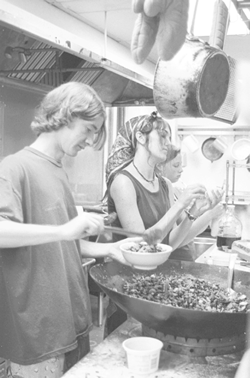OSCA
Concentrates on Creating Diverse Communities
by Matthew Green
“I
could probably count them on my hands,” an Oberlin co-oper
said, in reference to the number of minorities living in her co-op
last year.
After taking a tour of the co-ops in the Oberlin Student Cooperative
 |
|
Broadening
Appeal: Some believe that OSCA’s narrow dining
options exclude some OC students. (photo by David Sinden)
|
|
Association
, a conclusion can be quickly drawn that racial diversity is not
one of the organization’s strengths. Although no demographic
statistics are available, it is widely acknowledged that OSCA’s
membership is predominantly white. While this extremely sensitive
issue is one that many people in OSCA have expressed concern with
for some time, little direct action and initiative have been taken
until recently.
An incident in Harkness Co-op last year drew much attention to the
issue of racial diversity and accessibility in both OSCA and the
College community as a whole. During a concert in the co-op, an
individual who was reportedly not a student wrote “White People
$uck” in large letters on a wall. The vandalism, while disturbing
most of the residents, was also effective in inspiring a series
of in-depth discussions on the issue.
“I think it was an educational opportunity for a lot of people,”
junior Forrest Crawford, current President of OSCA, said. “It
helped the Harkness community and the cause in general.”
Having been in office for less than a month, Crawford has made the
task of addressing the lack of diversity in OSCA one of the organization’s
top priorities.
“This has become a priority for us since it was so sorely neglected
in past years,” he said. “OSCA is lacking a lot of perspective
on diversity, not just in terms of race but also class and religious
background.”
Among the many issues being addressed is that of accessibility.
That the co-ops are inaccessible to minority students has been a
frequently articulated complaint. Why this is and how it can be
changed are questions that those involved in the governing of OSCA
have begun to ask. That is, how can the cooperative environment
be more inclusive and welcoming, regardless of the race or ethnicity
of those wishing to enter? It has become evident that the answers
to these exceedingly complex questions are not easy to find.
According to its mission statement as presented on its website,
the OSCA Accessibility Committee “sees its role as increasing
the extent to which potential members who are traditionally marginalized
by OSCA feel OSCA is accessible to them.” Two methods are offered
as to how accessibility might be increased. The first involves a
greater degree of education and publicity about cooperatives to
those not involved in them. There is the concern that students both
outside and inside OSCA often receive misinformation pertaining
to the nature and mission of its co-ops. The second method is stated
as, “starting a conversation and critique within OSCA about
issues of culture, privilege, appropriation, accessibility, social
justice and co-operative principles.”
“We want everyone in OSCA to feel comfortable about joining
a [co-op] lottery. Right now that is not the case,” junior
Amber McMillan, the All-OSCA Accessibilities Co-Coordinator, said.
“I feel like there are people in OSCA who don’t know they’re
racist,” she said, adding that the most effective way to counteract
this situation is through an educational approach.
OSCA has recently made efforts to create several written policies
and proposals that are intended to inspire this dialogue, with the
hopes of increasing diversity by making co-ops more accessible to
marginalized students. Many feel this a good place to start.
“Ideas can be transient if they’re not written down and
committed to policy,” Crawford said. “[These proposals]
are a very necessary base. . . we need this to justify what we do
and ensure they exist when the people who implement them are gone.”
He also stated the importance of amending OSCA’s bylaws by
including a statement of anti-racist intent within the institution.
A careful examination of impediments that exist within the institution
as well as a look at current membership are key factors behind the
creation of the new policies and proposals. A new membership policy
went into effect this year, in which lower income students can jump
the housing and dining waitlist that all OSCA applicants are placed
on. “Financial accessibility is of paramount importance,”
Crawford said.
OSCA has also introduced a proposal to hire someone, unaffiliated
with OSCA or the College, to conduct a study of the nature and causes
of inaccessibility.
A third proposal involves working directly with the Multicultural
Resource Center (MRC), in which there would be mandatory diversity
training workshops for every OSCA staff-member. Housing Loose Ends
Coordinators (the RA equivalent in a housing co-op) will go through
their own training next month. The sessions will be conducted by
professional, full-time MRC staff members. The MRC will also conduct
dorm raps in housing co-ops in which topics involving racism, white
privilege and heterosexism will be discussed.
“The MRC is excited about being involved in OSCA,” Rachel
Beverly, Assistant Dean of Students and Director of the MRC, said.
“I think diversity training is a step in the right direction...
We want students to begin to have conversations about what diversity
means on this campus, especially in OSCA, and to help members be
more inclusive. Any diversity training –– helping students
have conversations about multiculturalism –– can effect
change even in a small way, one student at a time.”
Some co-opers feel as though each co-op forms its own “clique.”
OSCA has made attempts to do away with the various associations
and images attached to certain co-ops by abolishing status quo,
carry-over policies that remain in existence from year to year.
The only two co-ops for which this does not apply are Kosher-Halal
and Third World.
These two dining co-ops, while part of OSCA, each have distinct
identities. They both require a separate application process and
each has specific rules, guidelines and missions. Both have received
criticism for their political nature and selective application process
and have been charged by some as being “antagonistic.”
They are also the two most racially diverse co-ops.
OSCA,
while recognizing the value of these co-ops, has also become aware
of their separation from the rest of the system and expressed a
desire to increase the level of communication and unity among all
of its co-ops.
Kosher-Halal Co-op is primarily geared towards Jewish and Muslim
students with specific dietary guidelines. Third World Co-op, founded
in the ’90s, is intended as a safe-space for people of color,
first-generation and low-income students.
Currently, Third World, with a capacity of 85, has only 10 members.
Efforts are being made to recruit new members who fit the criteria,
but the process has been difficult, members said. A lack of information
about the co-op and students not wanting to take time to apply or
participate have all been given as reasons for the co-ops’
low enrollment figures.
At
6:20 on Tuesday evening, the small group that currently composes
the membership of Third World sat together at a single table to
eat dinner. The atmosphere was intimate, described by one member
as being like a “family.” Speaking under the condition
of anonymity, the members, all of whom are minorities, discussed
their views on OSCA and reasons for choosing to eat in Third World.
That
the members felt little to no connection with OSCA and were simply
more comfortable and accepted here than in any other co-op seemed
to be the general consensus. Members spoke of the strong sense of
community, familiarity and identity they felt in Third World in
contrast to the rest of OSCA.
“I don’t even think of Third World as being in OSCA. I
feel very separate from the rest of OSCA and would never join it
except in this space,” one member said.
Most members voiced a sense of alienation that they felt when eating
in other OSCA co-ops. Some described a sense of unfamiliarity with
the processes they were exposed to, in which there was a completely
different set of priorities at hand.
“The mindset of people there is something foreign to me,”
one member said.
It was pointed out that, often times, policies concerning vegetarianism
and veganism had the effect of furthering the sense of alienation
that was felt.
“It is not food you’re familiar with…there aren’t
options for other people,” another member said, emphasizing
the notion that health food is very much a luxury that lower-income
people generally can’t afford.
“OSCA is not catering to minorities,” someone else added.
One member spoke about her experience eating in Keep Co-op during
a previous year. “I have never had an experience like it before,
where the environment was so foreign, there was no way to identify
or socialize within that space,” she said.
Some members felt that racism, though not always intentional, was
definitely present within OSCA, largely due to the ignorance and
false assumptions of certain co-opers. It was emphasized that a
greater degree of awareness was necessary. All agreed that communication
and dialogue from both sides were important elements in achieving
a sense of increased tolerance, understanding and acceptance among
all members of OSCA.
|




